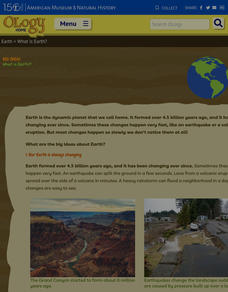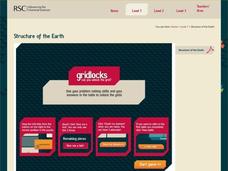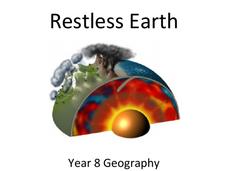Core Knowledge Foundation
The History of the Earth Tell It Again!™ Read-Aloud Anthology
A read-aloud anthology focuses on Earth's history. Over three weeks, young scholars listen to and discuss stories about the layers of the Earth, minerals, fossils, different kinds of rocks, and dinosaurs. After the lesson's text, each...
Science 4 Inquiry
Layers of the Earth
We can't dig a hole through the Earth, so how do we know about the layers beneath our feet? Scholars learn about layering through hands-on exploration of common materials. They study the characteristics of each layer and apply their...
NOAA
Plate Tectonics Interactive
Here is a plate tectonics interactive that will really move your class! The first of a 13-part series introduces young geologists to the fundamental concepts and vocabulary they need to understand the interactions between crustal plates....
Channel Islands Film
Island Rotation: Lesson Plan 3
How far have California's Channel islands moved? What was the rate of this movement? Class members first examine data that shows the age of the Hawaiian island chain and the average speed of the Pacific Plate. They then watch West of the...
Curated OER
Density of Rocks
Given a variety of rocks, junior geologists calculate densities and correlate them to Earth's layers. As a simulation of continental crust, they experiment with how materials of differing density float in water. Finally, they compare the...
American Museum of Natural History
Edible Earth
Create an edible model of the Earth using crispy rice cereal, marshmallows, and chocolate, yum! Model layers include the outer core, inner core, mantle, and crust.
American Museum of Natural History
What is Earth?
Humans have only inhabited Earth for a short part of its existence. An online resource explains how scientists use clues from rocks and fossils to piece together information about Earth prior to humans. The online instruction includes...
CK-12 Foundation
CK-12 Earth Science Concepts for Middle School
Explore a variety of science concepts in an interactive textbook created for middle school scholars. A lengthy table of contents takes readers to pages comprised of a subject overview, outline, and summary. Follow links further to find...
Howard Hughes Medical Institute
Distribution of Elements in Earth’s Crust
How do scientists know the difference between a meteorite from space and a regular rock from the earth? Scholars read a passage and answer comprehension questions about the creation of the solar system. They extrapolate the main ideas to...
Royal Society of Chemistry
Structure of the Earth
What lies beyond the ground beneath our feet? Young geologists learn the four main layers of Earth with an engaging puzzle set. The interactive illustrates each layer, and users must place them correctly before they can progress to the...
Geographer Online
Restless Earth
In less than 25 years, the continent of Australia moved 4.9 feet thanks to plate tectonics. The presentation introduces the idea of the layers of the earth as well as plate tectonics. It goes into why the plates move and where we believe...
University of Alaska
Clay Model Earth
What a great way to incorporate hands-on learning while teaching about the earth's layers. The class observes an overhead transparency (linked in Included Materials) as they create their own model Earth using different colors of clay....
NOAA
Wooly Magma
Model the earth's core with a neat activity that uses science as an inquiry and step-by-step procedures. The activity acquires a lot of assistance from the teacher or volunteer helpers.
Scholastic
Final Project: The Earth, Inside Earth
Follow in Jules Verne's footsteps and take a journey to the center of the earth! Middle schoolers work together to design a trip inside the earth using their knowledge from the previous lessons in the unit.
Scholastic
Lesson Four: The Earth, Layers of Earth
Get your hands dirty with a set of earth science activities! Class members delve into a hard-boiled egg to find the similarities to the earth's layers, create a papier-mâché model of the earth, craft a simulation of the earth's...
Scholastic
Lesson One: The Earth, Background and Glossary
How much do you really know about our planet? Middle schoolers build up their prior knowledge about Earth, its placement in the solar system, its composition, and important geological vocabulary with an introductory earth science lesson.
Chymist
Earth Science
Explore the consistency of the earth's layers and soil through modeling. By conducting an engaging experiment, learners develop a model for the earth's layers and a soil profile using edible materials. Each material is chosen based on...
Mr. E. Science
Plate Tectonics
Get a detailed look at plate tectonics with a 14-slide presentation that highlights the Earth's layers, continental drift, seafloor spreading, the theory of plate tectonics, and boundary types. Each slide provides thorough explanations,...
Environment Agency - Abu Dhabi
Plate Tectonics
Young scholars observe a presentation on plate tectonics, layers of the earth, and plate boundaries. They then use the Internet to research major plates and label them on a world map.
It's About Time
Taking a Ride on a Lithospheric Plate
Assist your pupils and broaden their horizons with several activities that determine the exact positioning of various communities over the globe. Pupils use data from the Global Positioning System to determine the position and rate of...
Curated OER
Plate Tectonics: Fourth Grade Lesson Plans and Activities
The pre-lab portion of the lesson introduces emerging geologists to the various layers that make up Earth. After completing a sheet on the identification of the layers, class members simulate plate boundaries and their...
Curated OER
Plate Tectonics: Fifth Grade Lesson Plans and Activities
Fifth graders continue their investigation of the plate tectonics cycle with an exploration of the movement of Earth's crust. During the lab, young geologists conduct an experiment to discover the result of different types of stress...
Curated OER
Earthquakes: Sixth Grade Lesson Plans and Activities
Young seismologists learn more about plate tectonics with a set of pre-lab, lab, and post-lab lessons plans on earthquakes. After exploring how waves travel through various materials, sixth graders record their observations and draw...
Brooklyn Children’s Museum
Volcanoes!
Give young geologists an up close and personal look at volcanoes with a series of hands-on earth science lessons. Whether they are investigating the properties of igneous rocks, building their own volcanoes, or making fudge to model the...

























